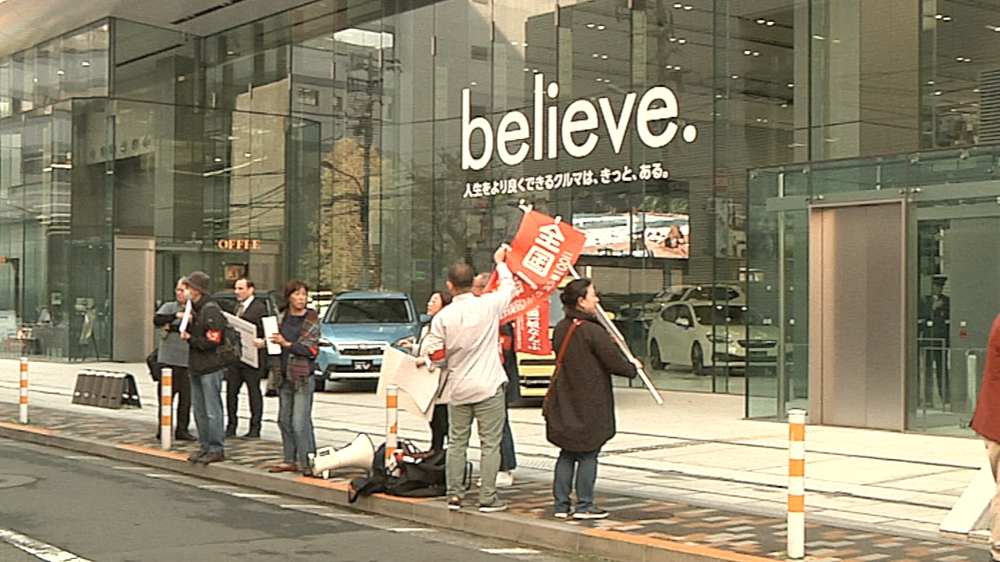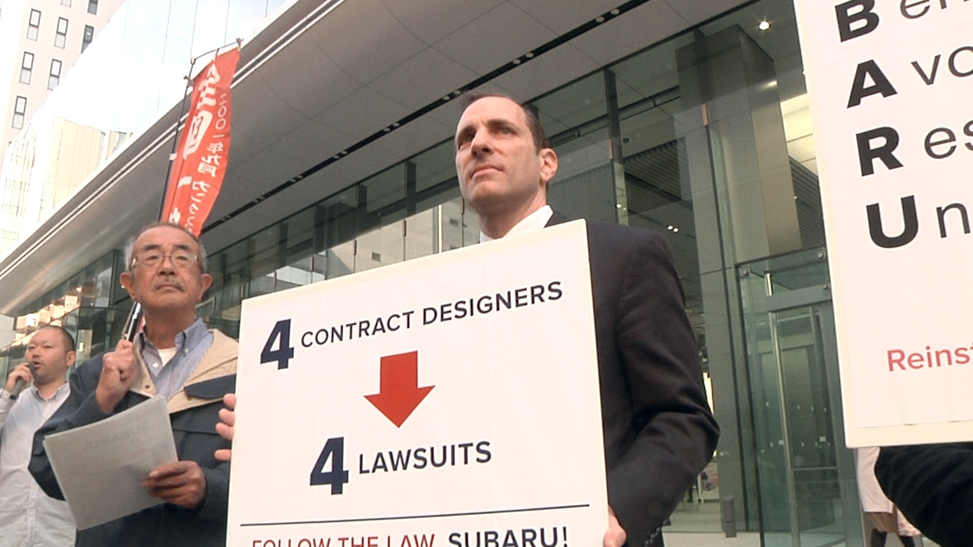03:23

Since the new Japanese labor laws, originally passed in 2013, came into full effect last year, some companies have acted unlawfully to evade rules that benefit long-term contract workers. Employees have been forced out of their companies, overwhelmed by the time and cost required for a legal battle. Now, a number of workers in Japan are speaking out about the effect of the new labor laws.
The sign at the Tokyo headquarters of one of Japan's major car manufacturers Subaru says "believe," but a former employee is fighting the same company to be heard and believed.
Car designer David Cohen says the company refused to renew his contract shortly before he would have been eligible for continuous employment, and that the automotive firm's actions should be judged illegal.
"Clearly the company is violating the law," Cohen stated, continuing, "the company can only refuse the renewal if they have just cause, and objectively reasonable reasons to do so."

David Cohen with a placard at a labor protest. /CGTN Photo
David Cohen with a placard at a labor protest. /CGTN Photo
In his lawsuit for reinstatement, Cohen sites Japan's revised Labor Contract Law, which introduces a "five-year rule" for fixed-term employment contracts. If the contract period exceeds five years, an indefinite (continuing) contract can be requested. The purported purpose of the law is to prevent employer abuse of fixed-term contracts, and to stabilize employment for workers. As of press time, Subaru Motors, Cohen's former employer, had not replied to multiple requests for comment on the case.
"If my contract was renewed just one more time, then I would have been given a right to have a permanent contract situation, which would give me a great sense of security," lamented Cohen.
Whether Japan's laws protecting international and contract workers are sufficient is a matter open to debate. But on November 18 in Tokyo, David Cohen joined by supporters from his labor union united to demonstrate in front of Subaru's Ebisu District headquarters to ensure that their voices are heard by company executives.
Timothy Langley, of Tokyo-based public affairs and management consultancy Langley Esquire, is one who frequently hears the complaints voiced by international workers in Japan. "Working in Japan is hard, the hours are long, the pay is low, and you are discriminated (against) like crazy when you work here as a foreigner, especially as a temporary worker," Langley said about the country's employment situation.

Timothy Langley discusses Japan's labor conditions. /CGTN Photo
Timothy Langley discusses Japan's labor conditions. /CGTN Photo
Japan's need for international staff to assist the nation's growing elderly populace is well known, and the desire for creative, globally competitive international business teams has spurred the Abe administration to encourage highly skilled foreign workers by easing visa requirements. But Japan's amended labor laws may fall short of ensuring employment security, especially for contract workers.
Langley points out some of the most common perils for international employees in Japan: "Foreigners get hit hardest on child leave, on overtime, on early retirement, or for example being fired because 'there's a redundancy.'"
If Japan's revised labor laws were truly intended to benefit contract workers, the result has frequently been the opposite, providing an incentive to companies to halt contract renewal, often just days before the employee has the chance to continue permanently. In David Cohen's case, his contract was renewed nine times, expiring just one day before (legally mandated) conversion to continuous employment.

International workers across industries. /CGTN Photo
International workers across industries. /CGTN Photo
Langley detailed some of the techniques, tricks, and evasions that companies use to avoid an additional permanent employee from being added to their firm's rolls: "The violations here are rife, and they use all sorts of tactics – early retirement, redundancy, we hired somebody, your job 'just disappeared.'"
Critics say that Japan's new labor laws and the accompanying job insecurity may impede both Japan in its goal to utilize international talent, and those who seek to supply it.
Cohen reflected on the situation and the difficult position into which it has thrust him in Japan, a country that he has come to love: "I'm not sure if the new laws are going to help attract these workers because it prevents (them) from having long-term employment in Japan."